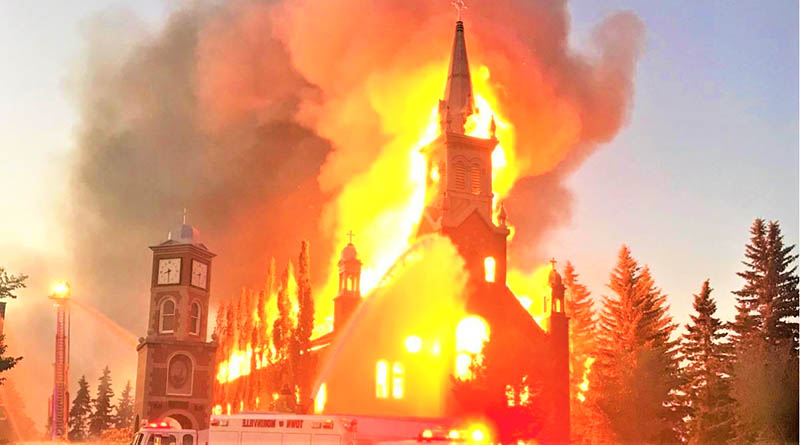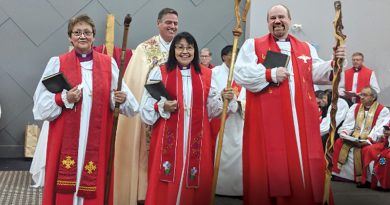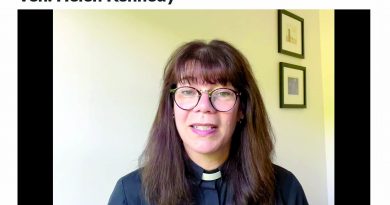Indigenous leaders take strong stance against church fires
(Staff) ON JULY 3, after two Roman Catholic churches had been reduced to cinders in suspicious fires, the non-Indigenous head of the B.C. Civil Liberties Association, Harsha Walia, tweeted “burn it all down.”
However, during a news conference two days later, a group of residential school survivors called for an end to arson attacks on churches after several Catholic and Anglican churches were vandalized or damaged by fire (many on reserves) following the recovery of unmarked graves at former Indian residential school sites. Even some churches whose denominations were never involved in the IRS have been desecrated.
Residential school survivor Jessie Malcolm condemned the vandalism while fighting back tears. “It’s not going to bring back anybody,” she said.
Pentecostal assistant minister Jenn Allan-Riley, a Sixties Scoop survivor and the daughter of a residential school survivor, said the acts of vandalism are sowing discord between Indigenous people and the rest of Canada.
“Burning down churches is not in solidarity with us Indigenous people,” Allan-Riley told the news conference. She attributed the action to non-Indigenous actors.
“Whoever is doing this, you’re going to wake up a very ugly, evil spirit in this country,” she said.
“When she [Walia] says burn them all down, that means a Pentecostal church, that means a Salvation Army church, which has done amazing things in Canada and [both] had nothing to do with residential schools.”
Some of the non-Indigenous churches that have been desecrated have included: a Vietnamese evangelist church and an African evangelical church in Calgary, serving a congregation made up almost entirely of refugees who had fled persecution, and a Filipino Catholic church in Vancouver that worships in Tagalog.
It is not known if the arsonists are Indigenous or not.
The Prime Minister condemned the attacks on churches during a news conference on July 2. Many wish he had spoken sooner.
“It is a shame and indeed it is something that will prevent people who will seek solace in times of grief from being able to visit their own places of worship when they’ve been vandalized or burned,” Justin Trudeau said. “It is not the way forward.”
But then he added this controversial caveat: “…it’s fully understandable given the shameful history we are all becoming more aware of.”
After a suspicious fire July 1 at the Catholic cathedral in Yellowknife, the Dene Nation issued a press release the next day:
“We say to those responsible for the recent fire at St. Patrick’s Church, this is not the Dene way. We call upon you to step away from the path of anger and violence. We ask you to join with us to seek accountability peacefully and respect the wishes of our elders.”
“The Church and Canada must still be held accountable. The Churches and the Pope must acknowledge their role and apologize to our children’s families and communities. The Pope must commit the Churches to work with Canada and Indigenous governments to identify every child.”
But, the Dene Nation concluded, “violence is not the way to deal with injustice.”
Burning down churches on Indigenous lands hurts Indigenous Canadians. The 2011 National Household Survey found 63 per cent of Canada’s Indigenous population claimed Christianity as their religion. Around 42 per cent of Indigenous Canadians identify as Catholic.
As columnist Terry Galvin commented in The National Post: “Torching a church over these [Indian Residential school] crimes is no different than smashing synagogue windows over some uproar in Gaza, or vandalizing mosques over some wretched thing done by the Khomeinists in Tehran….”
And he noted: “Even those [Indigenous] leaders who reject Christianity entirely and profess a hatred of the institutions that interred generations of Indigenous children say they are just as disgusted and dismayed as devout Indigenous Christians are.”
And in hot, dry summer weather, there is always the danger that these fires could spread, causing death and devastating whole communities.
Another National Post columnist Raymond J. de Souza argued, “Arsonists and vandals are not seeking reconciliation, but revenge.” Yet all too often it is Indigenous Christians who are being victimized.
Police should treat and prosecute church arson with the same force as they would with any other building.
In the wake of the arson attacks and vandalism, some churches are taking pre-emptive action.
Garden River First Nation, east of Sault St Marie, Ontario is distributing a letter asking for respect for St. John’s Anglican Church, as the resting place of Chief Shingwauk, who is buried under the altar.
Community member Lana Grawbarger remarked that the head of the Anglican Church of Canada apologized 29 years ago at a national sacred circle gathering in Minaki, Ont. “They followed the apology with action and funding for healing programs and strategies and continue to do so. Let us continue to move forward in a good way,” she said.
Anglican churches recently damaged or destroyed by arson:
St John’s Anglican Church, Tuscaroras, on Six Nations of the Grand River in Ontario destroyed on June 12.
St. Paul’s Anglican Church located in Gitwangak (Kitwanga), an abandoned church 50km from New Hazelton in northwestern B.C., destroyed on July 1.
The St. Columba Anglican Church in downtown Tofino damaged on July 3.
On July 19, the St George Coptic Orthodox Church in Surrey B.C., which had no association with the Indian Residential Schools, was burnt down. It was built by refugees who had fled religious persecution in the Middle East and saw Canada as a safe haven. It was the 48th church to be vandalized or burned since May 28.
(Updated July 22.)




